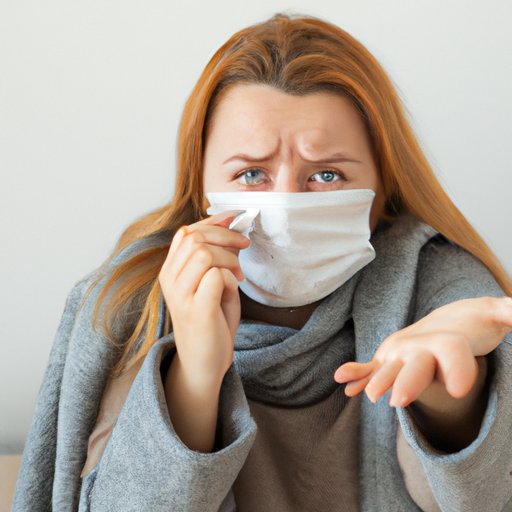
Introduction
The flu, also known as influenza, is a contagious respiratory illness caused by influenza viruses that can cause mild to severe illness. Most people recover within a few days to less than two weeks, but some people can develop complications such as pneumonia, bronchitis, or other severe diseases.
While it is recommended to get vaccinated and take necessary precautions to avoid getting infected with the flu virus, people may still wonder if it is possible to get the flu twice. This article will explore the possibility of getting the flu twice and provide practical tips on how to avoid it.

The possibility of getting the flu twice: What you need to know
It is possible to get the flu twice. Influenza viruses constantly change through antigenic drift and antigenic shift, meaning that the virus regularly mutates, and new strains of influenza virus can emerge. Even if you have had the flu before, your immune system may not recognize the new strain of the virus.
Factors that can increase the likelihood of getting the flu twice
Several factors can increase the likelihood of getting the flu twice, including:
- Age: young children and older adults are more likely to get the flu twice due to weaker immune systems.
- Underlying health conditions: people with chronic diseases or conditions that affect the immune system may be more susceptible to getting the flu twice.
- Environmental factors: people who live in areas with higher flu activity or come into close contact with infected individuals are more likely to get the flu twice.
- Incomplete immunity: having the flu or getting vaccinated does not guarantee complete immunity. You may still get infected by a different strain of the virus.
Importance of understanding the risk of getting the flu twice
Understanding the risk of getting the flu twice can help prevent further illness and complications. It is essential to recognize the signs and symptoms of the flu, take necessary precautions, and seek medical attention if necessary.
Can you really get the flu twice in one season?
Definition of flu season
Flu season typically occurs during the fall and winter months in the Northern Hemisphere and the opposite seasons in the Southern Hemisphere. During this period, the influenza virus is more prevalent, and people are more susceptible to getting the flu.
Possibility of getting the flu twice in one season
It is possible to get the flu more than once during the flu season. Influenza viruses can mutate during the season, leading to different strains of the virus circulating in the population. If you have already had the flu once during the season, your immune system may not recognize the new strain of the virus, making you more susceptible to getting infected again.
How to differentiate between two separate flu episodes and a prolonged one
Sometimes, it can be challenging to differentiate between two separate flu episodes and a prolonged one. If you experience flu-like symptoms such as fever, chills, cough, sore throat, runny or stuffy nose, headache, body aches, or fatigue, it is essential to seek medical attention. A healthcare provider can determine whether you have a new case of the flu or a prolonged one.
Exploring the science behind getting the flu twice
Understanding the immune system response to influenza virus
When you get infected with the flu, your body’s immune system produces proteins called antibodies to fight the virus. These antibodies can recognize and eliminate the specific strain of the virus that caused the illness.
The antibodies remain in your body and can provide immunity to the specific strain that caused the illness. However, your immune system may not recognize a new strain of the virus that is different from the one that caused the previous illness. Consequently, you can get infected with the flu again.
The impact of antigenic drift and shift on the ability to get the flu twice
Antigenic drift and shift refer to the process by which the influenza virus changes constantly, making it difficult for the immune system to recognize and fight the new strains of the virus.
Antigenic drift occurs when the influenza virus mutates slowly over time, resulting in minor changes to the viral proteins that the immune system recognizes. This process explains why the flu vaccine needs to be updated every season. The vaccine contains the predicted strains of the virus that are likely to circulate during the flu season.
Antigenic shift occurs when two different strains of the influenza virus combine to form a new strain that the immune system has not recognized before. This process can result in a pandemic if the new strain is highly virulent and spreads rapidly.
Differentiating between reinfection and prolonged illness
It is possible to experience prolonged flu symptoms due to the body’s response to the virus, such as inflammation. However, prolonged symptoms may also be due to bacterial infections, which can lead to secondary infections such as pneumonia. It is essential to seek medical advice if you experience prolonged flu-like symptoms to rule out bacterial infections.
How to avoid getting the flu twice: Tips and tricks from the experts
Importance of good hygiene practices
Good hygiene practices can reduce the risk of getting the flu twice. This includes:
- Washing your hands regularly for at least 20 seconds with soap and water
- Covering your nose and mouth when coughing or sneezing with a tissue or your elbow
- Avoiding close contact with people who are sick
- Cleaning and disinfecting frequently touched objects and surfaces
The significance of getting vaccinated
Getting vaccinated is the most effective way to prevent getting the flu twice. The flu vaccine protects against the strains of the virus predicted to cause illness during the flu season. It is recommended to get vaccinated annually since the vaccine may not provide complete immunity against all strains of the virus.
Dietary considerations for optimal health
Eating a healthy, balanced diet can boost your immune system and reduce the risk of getting the flu twice. Foods high in vitamins C and D, zinc, and antioxidants can enhance your immune system and prevent infection.
Lifestyle changes to prevent the recurrence of the flu
Other lifestyle changes that can reduce the risk of getting the flu include:
- Quitting smoking: smoking weakens the immune system and makes it more difficult to fight infections
- Reducing stress: stress can affect the immune system and increase the likelihood of getting sick
- Getting enough sleep: lack of sleep can weaken the immune system and increase vulnerability to infections.
When to seek medical attention after getting the flu twice
Signs and symptoms of serious complications of the flu
Sometimes, the flu can lead to severe complications such as pneumonia, bronchitis, or other respiratory infections. It is essential to seek medical attention if you experience any of the following symptoms:
- Difficulty breathing
- Chest pain or pressure
- Sudden dizziness or confusion
- Severe vomiting or dehydration
- Seizures or convulsions
- Bluish lips or face
Importance of proper medical attention
Seeking medical attention can help diagnose and treat serious complications of the flu. A healthcare provider can monitor your symptoms and provide necessary treatment to prevent further illness and complications.
Guidelines for when to seek emergency care
You should seek emergency medical attention if you experience any of the following symptoms:
- Difficulty breathing or shortness of breath
- Persistent chest or abdominal pain or pressure
- Sudden dizziness or confusion
- Severe or persistent vomiting or diarrhea
- Seizures or convulsions
- Uncontrolled bleeding
Staying protected against the flu: Vaccinations and other preventive measures
Understanding the different types of flu vaccines
There are several types of flu vaccines available, including:
- Standard dose flu vaccine
- High-dose flu vaccine
- Adjuvanted flu vaccine
- Cell-based flu vaccine
The choice of vaccine depends on several factors, including age, underlying health conditions, and personal preference.
The effectiveness of the flu vaccine
The flu vaccine is the most effective way to prevent getting the flu twice. However, the vaccine may not provide complete immunity against all strains of the virus. The effectiveness of the vaccine depends on several factors, including how well it matches the circulating strains of the virus and the age and health of the person getting vaccinated.
Other flu-prevention tools
In addition to vaccination, other flu-prevention tools include:
- Antiviral medications
- Isolation and quarantine of infected individuals
- Social distancing measures
- Mask-wearing
The psychological impact of getting the flu twice in one year
The impact on mental health and wellbeing
Getting the flu twice in one year can have a significant impact on mental health and wellbeing. Fear of getting infected again can cause anxiety, stress, and depression. It is essential to recognize the psychological effects of getting the flu twice and seek support when needed.
Coping strategies for dealing with the fear of getting the flu again
Some coping strategies for dealing with the fear of getting the flu again include:
- Talking to a healthcare provider or mental health professional
- Maintaining a healthy lifestyle and good hygiene practices
- Taking necessary precautions to avoid getting infected again
- Staying positive and focusing on the present
Importance of recognizing the psychological effects
Recognizing the psychological effects of getting the flu twice and seeking support can help improve mental health and prevent further complications related to stress, anxiety, and depression.
Conclusion
In conclusion, while it is possible to get the flu twice, understanding the risk factors and taking necessary precautions can reduce the likelihood of reinfection. Good hygiene practices, getting vaccinated, and healthy lifestyle choices can help prevent getting the flu twice. It is essential to seek medical attention if necessary and recognize the psychological effects of getting the flu twice.
For more information on getting the flu twice and other related topics, consult your healthcare provider or visit official health websites.




